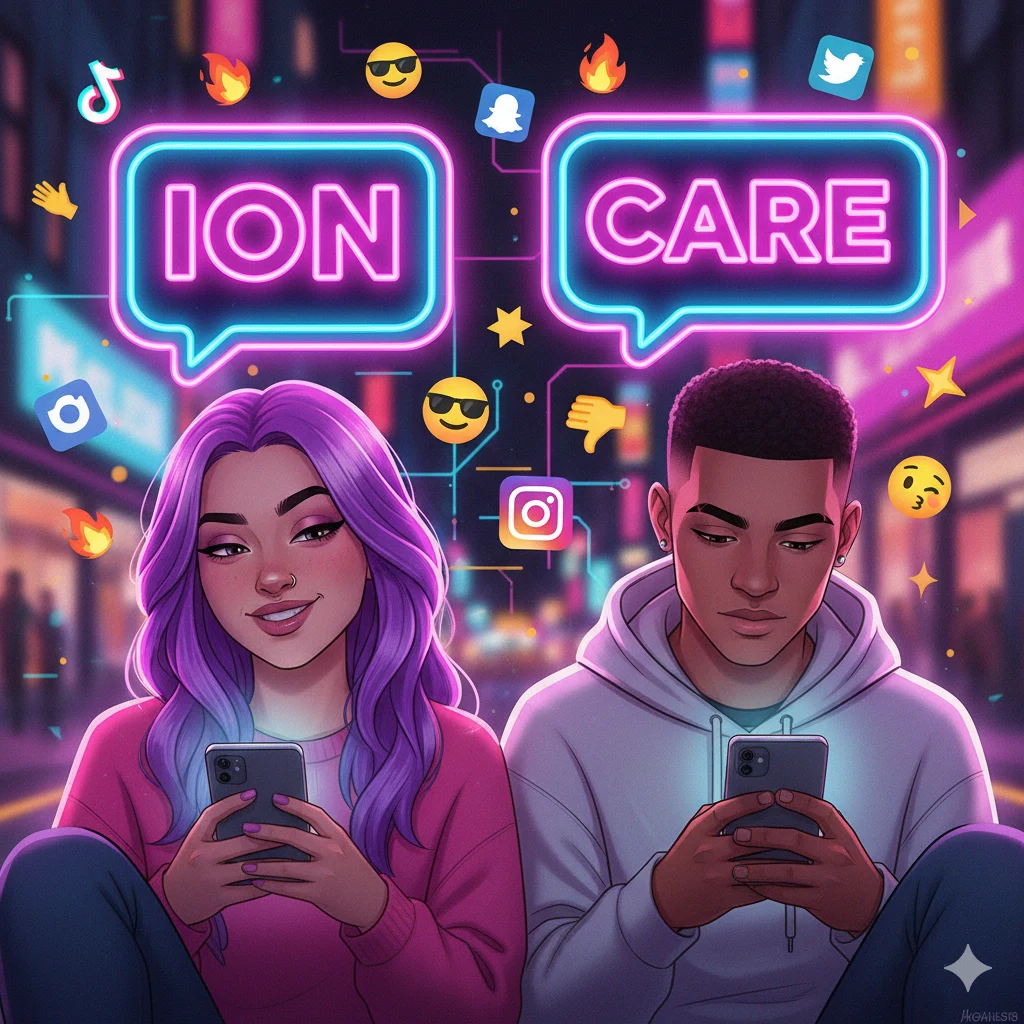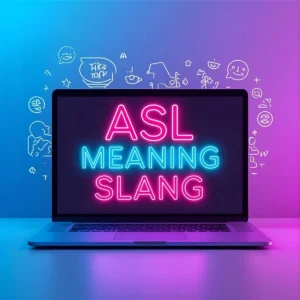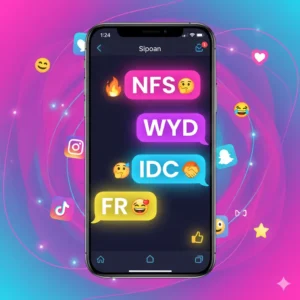Every day, slang evolves faster than we can scroll. One moment it’s “fr,” the next it’s “cap,” and suddenly everyone’s typing “ION” — leaving some people confused. You’ve probably seen comments like “ION care,” “ION know,” or “ION even like him fr,” across TikTok, Snapchat, or Twitter (now X).
At first glance, “ION” might look like a scientific term for chemistry class. But in slang, it’s something completely different — a short, catchy way to say “I don’t.”
In this article, we’ll break down exactly what ION means in slang, how it’s used in conversations, where it came from, and why it’s become one of Gen Z’s favorite internet abbreviations.
What Does “ION” Mean in Slang?
In slang and texting, “ION” means “I don’t.”
It’s a phonetic abbreviation that comes from how “I don’t” sounds when spoken quickly in casual speech — like “Ion care” instead of “I don’t care.”
Here’s what it looks like in context:
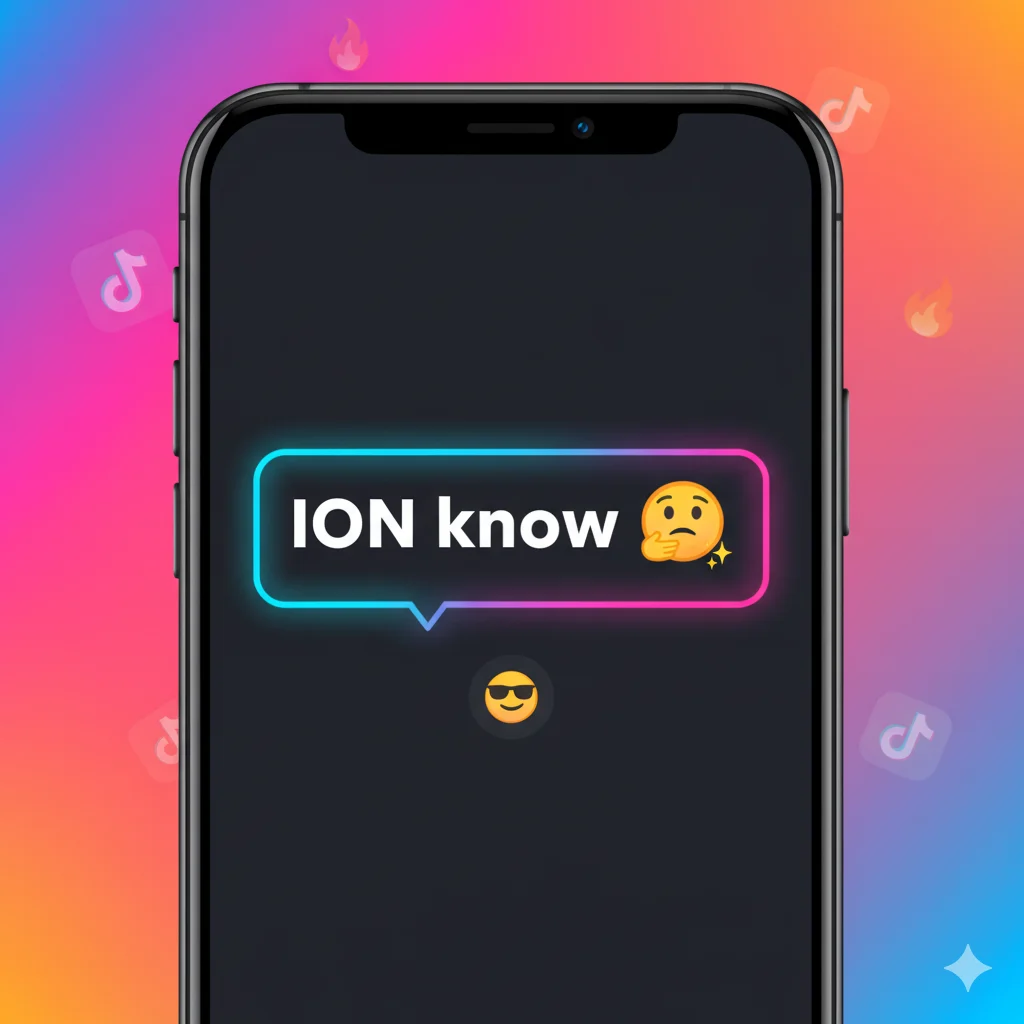
- “ION like her like that.” → I don’t like her like that.
- “ION care what he say.” → I don’t care what he says.
- “ION even know what’s going on.” → I don’t even know what’s going on.
It’s short, expressive, and easy to type — which makes it perfect for social media, texting, and memes.
The Origin of “ION” Slang
The slang “ION” emerged from African American Vernacular English (AAVE), where conversational speech naturally blends sounds and simplifies phrases. When people said “I don’t,” it often sounded like “Ion,” especially when spoken quickly.
As texting and social media became part of daily life, people started writing words the way they sounded, not necessarily the way they were spelled. That’s how “ion” became its own digital shorthand.
Platforms like Twitter, TikTok, and Snapchat helped spread the slang even further, turning “ION” into a global expression of attitude — often used to show detachment, humor, or independence.
How “ION” Is Used in Texts and Online
People use “ION” in casual chats to express a feeling of not caring, not knowing, or not wanting something. It’s quick, clear, and full of personality.
Here are some examples:
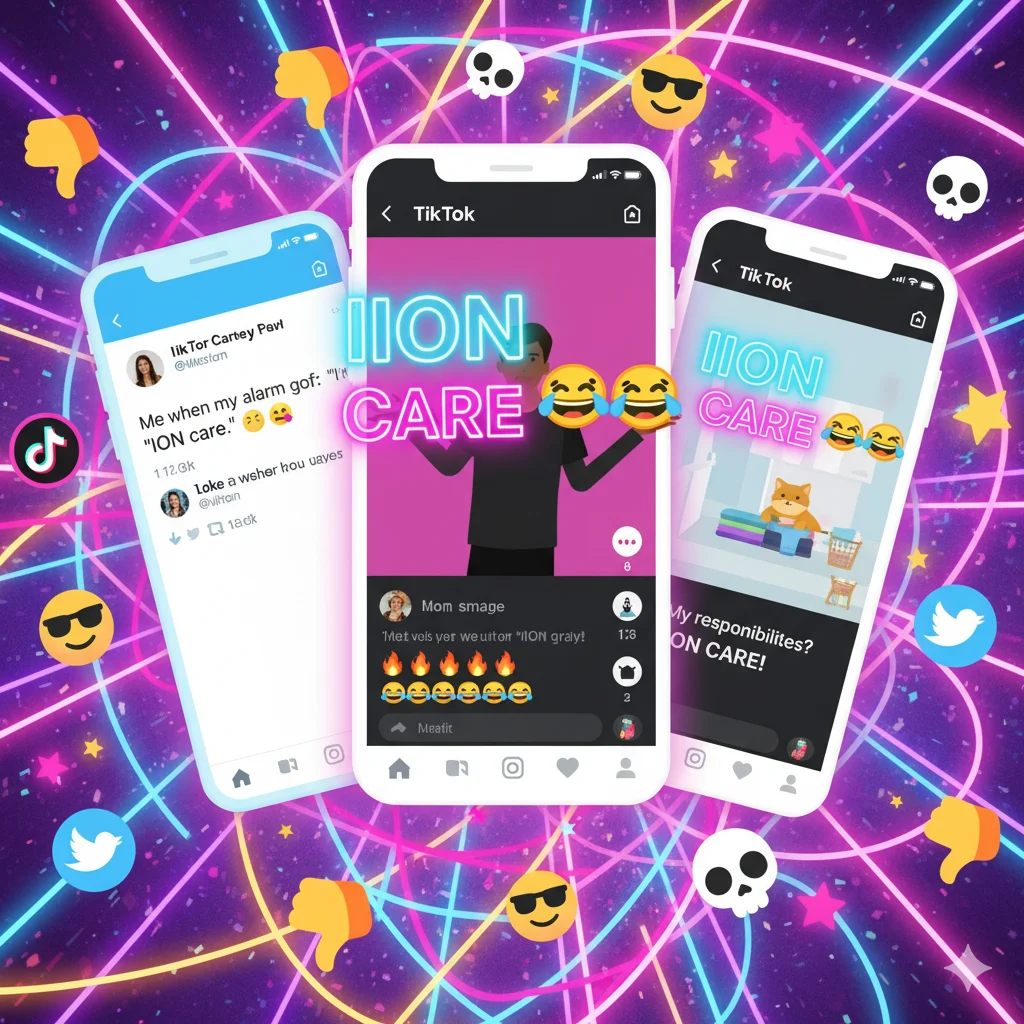
- “ION wanna go out tonight.”
- “She mad, but ION care 💅.”
- “ION even remember saying that 😭.”
- “ION think that’s a good idea.”
- “ION mess with fake people fr.”
The tone can shift depending on context — it might sound cold, funny, sarcastic, or confident. Adding emojis or punctuation changes the emotion too:
- “ION care 😭😭” → playful.
- “ION care.” → serious or done with it.
- “ION care 💅🔥” → confident and sassy.
“ION” vs “I Don’t”
While they mean the same thing, the tone and context make them different.
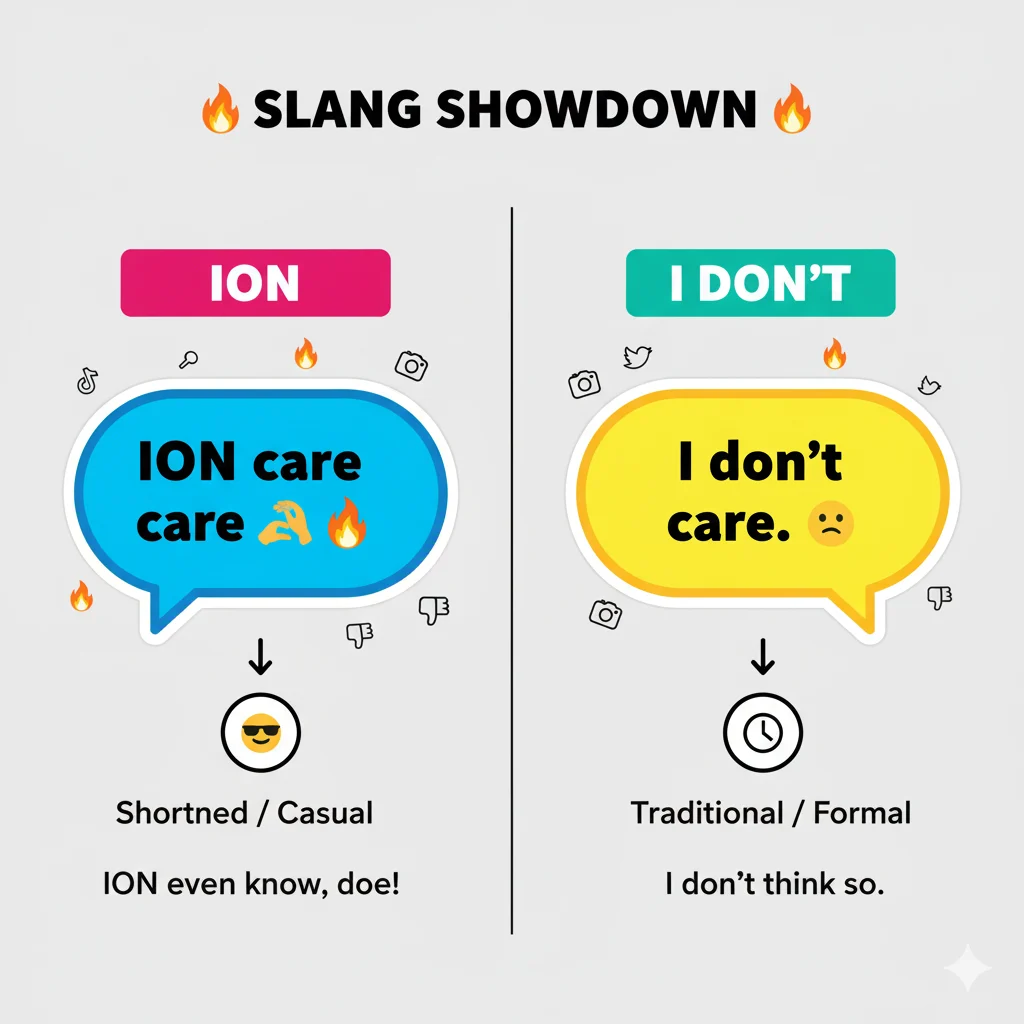
| Feature | “I Don’t” | “ION” |
|---|---|---|
| Tone | Neutral or polite | Casual, bold, or emotional |
| Use | Formal writing, speech | Texting, memes, casual talk |
| Personality | Plain | Expressive, confident |
| Audience | Everyone | Mostly Gen Z and online users |
Basically, “ION” adds attitude. It’s how you’d text a friend, not how you’d talk to your boss.
Common Variations of “ION”
Slang evolves fast, and people love to remix it. Here are some popular variations you might see:
- IONGAF → I don’t give a f**.*
- IONK → I don’t know.
- IONW → I don’t want.
- IONL → I don’t like.
Each variation keeps the “ION” root but shortens or replaces the rest for faster texting.
The Emotional Power of “ION”
Even though it’s short, “ION” carries emotional weight. It can mean you’re tired, unbothered, or simply done with drama.
For example:
- “ION care” → I’m over it.
- “ION wanna argue.” → I’m staying calm.
- “ION feel like talking.” → Leave me alone.
This is why “ION” fits perfectly into meme culture. It’s the go-to slang for expressing detachment or self-confidence — and sometimes, humorously fake apathy.
“ION” in Memes and Pop Culture
You’ll often see “ION” used in funny posts and memes, especially when people are pretending not to care (even though they clearly do).
For example:
- Meme caption: “She texted him back after saying she was done — ION blame her tho 😭.”
- TikTok caption: “ION care what nobody say, this filter fire 🔥.”
- Tweet: “ION even know what my goals are anymore 😭💀.”
Celebrities and influencers sometimes use “ION” too, especially in song lyrics or captions. It’s become part of the digital personality toolkit — casual, expressive, and attitude-filled.
Why “ION” Became So Popular
There are a few reasons “ION” blew up online:
- Simplicity: It’s short and easy to type.
- Relatability: Everyone’s felt unbothered or tired at some point.
- Tone: It perfectly captures that “I’m chill but also done” energy.
- Cultural Influence: AAVE expressions often become mainstream through music, memes, and TikTok trends.
Just like “fr,” “cap,” or “bet,” “ION” found its place in the modern slang dictionary — not as a typo, but as a statement.
“ION” in Music and Rap Culture
Slang from AAVE often spreads through music and hip-hop lyrics, and “ION” is no exception.
Artists have used “ION” in songs to express emotion, defiance, or confidence. You’ll find it in lyrics like:
- “ION trust nobody.”
- “ION care what they think.”
- “ION sleep, I grind all night.”
The word fits perfectly with rhythm, flow, and tone — making it a natural fit for rap verses and captions.
The Grammar Debate: Is “ION” Wrong?
Technically, yes — “ION” isn’t grammatically correct. But slang doesn’t follow grammar; it follows vibe and context.
In informal spaces like texts, memes, and online chats, breaking grammar rules is often what makes slang appealing. It feels authentic and relatable.
So, while you shouldn’t write “ION” in an essay, it’s perfectly fine in a tweet, comment, or text to a friend.
How to Use “ION” Naturally
If you want to use “ION” in your own messages, here are a few quick tips:
✅ Keep it casual. Use it with friends, not formal chats.
✅ Use it at the start of a sentence. That’s the natural rhythm.
✅ Pair it with emojis. They help express tone or emotion.
✅ Don’t overuse it. It works best when it feels natural.
Examples:
- “ION think I’m going tonight 😩.”
- “ION care what they say 💅.”
- “ION even remember what happened 😭.”
“ION” in Social Media Trends
On platforms like TikTok, Snapchat, and X (Twitter), “ION” has become a visual expression too — not just text. People say it out loud in videos or captions to match their mood.
TikTok users often lip-sync to sound bites or audios that include “ION” — usually to express disinterest or humor. For example:
🎥 A TikTok captioned: “When your bestie tells you drama you swore you’d ignore — ‘ION even care…’ (while clearly caring).”
That mix of humor and self-awareness makes “ION” perfect for short-form content.
“ION” vs Other Similar Slang Words
Here’s how “ION” compares to a few other common slang phrases:
| Slang | Meaning | Tone |
|---|---|---|
| ION | I don’t | Chill, unbothered |
| IDC | I don’t care | Direct, detached |
| IDK | I don’t know | Neutral |
| NGL | Not gonna lie | Honest, casual |
| FR | For real | Serious or confirming |
“ION” stands out because it’s more expressive than abbreviations like IDC or IDK — it feels personal and emotional, not robotic.
Real-Life Examples of “ION” Conversations
Here are a few realistic examples you’d see online:
Example 1:
Friend 1: “He still talking about you?”
Friend 2: “Ion care, fr 😭.”
Example 2:
Tweet: “Ion even like going outside no more 💀.”
Example 3:
Instagram caption: “Ion chase, I attract ✨.”
Each one shows a mix of humor, apathy, or sass — the key tones that define “ION.”
The Cultural Meaning Behind “ION”
At its core, “ION” represents authentic digital communication. It’s more than shorthand — it’s a reflection of personality and emotion in written form.
It shows how language adapts to culture, community, and technology. From AAVE roots to mainstream internet slang, “ION” bridges speech, identity, and humor — turning simple phrases into emotional expressions.
FAQs About “ION” Slang
Q1: What does ION mean in texting?
It means “I don’t.” It’s a shorthand form of casual speech.
Q2: Is “ION” the same as the science word “ion”?
No — in slang, “ION” means “I don’t.” In science, an ion is a charged atom or molecule.
Q3: Is “ION” bad grammar?
Yes, technically. But in slang and digital communication, it’s completely acceptable.
Q4: Who uses “ION” the most?
Mostly Gen Z and millennials on TikTok, Snapchat, Twitter, and Instagram.
Q5: When should I avoid using “ION”?
Avoid it in professional or academic settings — it’s only for casual communication.
Conclusion: “ION” and the Evolution of Online Language
The slang “ION” shows just how creative online language can be. What started as a casual way of saying “I don’t” in speech turned into a digital symbol of mood and personality.
From AAVE origins to global slang fame, “ION” represents authenticity, emotion, and humor. It’s not about spelling — it’s about feeling.
So next time someone says “ION care,” they’re probably not just talking — they’re expressing an entire vibe in three simple letters.


